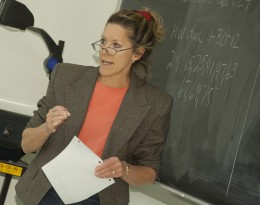
Since January, Witt has been teaching applied calculus as an adjunct instructor at Wright State as if she’s never been anywhere else.
Peering over wire-rimmed eyeglasses as she scribbles equations onto a blackboard with old-fashioned chalk, Betsy Stone Witt could easily be mistaken for a career math teacher. She tells her Wright State students little to make them doubt it.
So, she said, she noticed that “some eyes got sort of wide” recently when a small group of reporters and photographers trooped into her classroom, and one of them explained that Witt was a recently retired defense intelligence senior leader—the civilian equivalent of a one-star general—from one of America’s most secretive military organizations.
Since January, Witt has been teaching applied calculus as an adjunct instructor at Wright State as if she’s never been anywhere else. And she’s well familiar with the university, having earned her bachelor’s and master’s degrees in mathematics here in 1977 and 1978. But in the intervening three decades, she used her math skills to study foreign military technology for the National Air and Space Intelligence Center (NASIC).
Google NASIC’s name and you will get a list of intelligence centers and museums around Washington, D.C. But the deliberately low-profile NASIC is a massive intelligence operation located at Wright-Patterson Air Force Base, literally next door to Wright State. Whenever a hostile country fields a new fighter jet or launches a new missile, people at NASIC gather all the information they can about it and analyze the potential threat it represents to U.S. forces or America itself.
Witt said she always had a defense-related career in mind because her father was a civilian engineer at Wright-Patterson. After receiving her master’s degree, she went to work for a local defense contractor, using software tools to study the performance of air-launched missiles.
At the same time, some of Witt’s classmates took jobs at the Foreign Technology Division, NASIC’s forerunner. They soon lured her there. The work was the same, but instead of studying U.S. airborne weapons, she began studying foreign ones.
When Witt needed stronger engineering skills to advance her career, Wright State was close by. “I entered the workforce at NASIC as a mathematician, and then came back to school here at Wright State and started taking engineering courses,” she said. While she didn’t go for another bachelor’s degree, Witt said she took “tons of courses,” from digital signal processing to flight dynamics.
Witt spent the first part of her career analyzing threats to U.S. aircraft, from air-to-air missiles to whole air defense systems. Establishing herself as a leader in that area, she switched over to space and missiles.
Foreign space and missile technology has been a vitally important area for NASIC ever since Russia developed nuclear warheads and missiles that could reach the United States. While Russia has waned as a menace, new threats have emerged—North Korea is a nuclear state, Iran is feared to be on track to becoming one, and both have developed longer-range ballistic missiles. “If it’s medium, intermediate or long-range missiles, NASIC covers it,” Witt said. “NASIC handles about 90 percent of the space Intelligence analysis work.”
Witt finished her career as senior intelligence engineer for NASIC’s Space and Missiles Analysis Group. She also served as chair of the national Defense Intelligence Space Threats and Operations Committee, which oversees analysis and production of space threat intelligence for the nation.
Now, Witt is teaching because she enjoys it, and because she shares a growing concern that U.S. citizens are declining in the so-called STEM skills—science, technology, engineering and math. Witt thinks she can apply the skills she used in analyzing military threats to arm Wright State students with knowledge.
“Maybe there are students who want to go into engineering or science but are afraid of the math,” she said. After tutoring her own children and some of their friends in math, she said, “I felt I had a little bit of a flair for explaining the concepts, and so I thought this would be a great way to contribute… math doesn’t have to be a bump in the road for them.”
Betsy Witt will speak about how she applied mathematics in her career at 12:20 pm. on Thursday, April 5, in 143 of the Medical Sciences Building as part of the spring 2012 undergraduate seminar series.

 Wright State University Foundation awards 11 Students First Fund projects
Wright State University Foundation awards 11 Students First Fund projects  Gov. DeWine reappoints Board Treasurer Beth Ferris and names student Ella Vaught to Wright State Board of Trustees
Gov. DeWine reappoints Board Treasurer Beth Ferris and names student Ella Vaught to Wright State Board of Trustees  Joe Gruenberg’s 40-Year support for Wright State celebrated with Honorary Alumnus Award
Joe Gruenberg’s 40-Year support for Wright State celebrated with Honorary Alumnus Award  Wright State’s elementary education program earns A+ rating for math teacher training
Wright State’s elementary education program earns A+ rating for math teacher training  Wright State’s Calamityville hosts its largest joint medical training operation
Wright State’s Calamityville hosts its largest joint medical training operation 